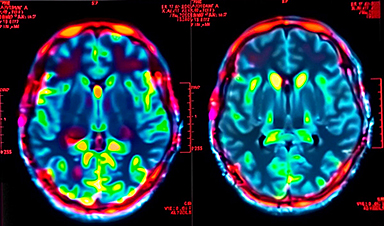A massive new study sheds light on how cannabis affects the brain, particularly during cognitive tasks.
Researchers analyzed over 1,000 young adults and found that both heavy lifetime use and recent cannabis consumption significantly reduced brain activity during working memory tasks. This impairment was linked to worse performance on tasks requiring focus, problem-solving, and instruction-following. Brain imaging revealed that key regions responsible for decision-making and attention were affected.
Cannabis Use and Brain Function: A Groundbreaking Study
A new study published in JAMA Network Open examines how both recent and long-term cannabis use affects brain function during cognitive tasks.
As the largest study of its kind, researchers analyzed over 1,000 young adults aged 22 to 36 using brain imaging technology. They found that 63% of heavy lifetime cannabis users showed reduced brain activity during a working memory task, with a similar impact seen in 68% of recent users.
Reduced Brain Activity and Working Memory Impairment
This decrease in brain activity was linked to poorer performance on working memory — a crucial function that helps people retain and use information for tasks. For instance, working memory enables someone to follow instructions, mentally visualize concepts, or solve problems like math equations.
“As cannabis use continues to grow globally, studying its effects on human health has become increasingly important. By doing so, we can provide a well-rounded understanding of both the benefits and risks of cannabis use, empowering people to make informed decisions and fully comprehend the potential consequences,” said the study’s first author Joshua Gowin, PhD, assistant professor of radiology at the University of Colorado School of Medicine on the University of Colorado Anschutz Medical Campus.
In the study, heavy users are considered young adults who’ve used cannabis more than 1000 times over their lifetime. Whereas, using 10 to 999 times was considered a moderate user, and less than 10 times was considered a nonuser.
MRI Scans Reveal Cannabis’ Impact on Brain Function
The researchers studied the neural response of participants during a magnetic resonance imaging (MRI) session and gave them seven cognitive tasks to complete. The tasks tested working memory, reward, emotion, language, motor skills – such as tapping a finger to map brain control, relational assessment and theory of mind.
The researchers found that cannabis had a statistically significant effect on brain function during working memory tasks, meaning the observed impact is very unlikely to be due to random chance. This effect was seen in both recent and lifetime cannabis users. The impact was less significant for the other tasks.
“We applied the highest standards to our research, setting rigorous thresholds for statistical significance across all seven cognitive function tests. To minimize the risk of false positives, we employed false discovery rate (FDR) correction. While some of the other tasks indicated potential cognitive impairment, only the working memory task showed a statistically significant impact,” adds Gowin.
Key Brain Regions Affected by Heavy Cannabis Use
During working memory tasks, the researchers found heavy cannabis use appeared to reduce brain activity in certain areas of the brain (dorsolateral prefrontal cortex, dorsomedial prefrontal cortex, and anterior insula). These regions of the brain are involved in important cognitive functions such as decision-making, memory, attention, and emotional processing.
However, Gowin mentions their research also suggests that abstaining from using cannabis before doing a cognitive task could help to improve performance. “People need to be aware of their relationship with cannabis since abstaining cold turkey could disrupt their cognition as well. For example, heavy users may need to be more cautious,” Gowin says.
Unanswered Questions: The Future of Cannabis Research
He adds, “There are a lot of questions we still need answers to regarding how cannabis impacts the brain. Large, long-term studies are needed next to understand whether cannabis use directly changes brain function, how long these effects last, and the impact on different age groups.”
Reference: “Brain Function Outcomes of Recent and Lifetime Cannabis Use” by Joshua L. Gowin, Jarrod M. Ellingson, Hollis C. Karoly, Peter Manza, J. Megan Ross, Matthew E. Sloan, Jody L. Tanabe and Nora D. Volkow, 28 January 2025, JAMA Network Open.
DOI: 10.1001/jamanetworkopen.2024.57069
News
Enhanced Antibacterial Polylactic Acid-Curcumin Nanofibers for Wound Dressing
Background Wound healing is a complex physiological process that can be compromised by infection and impaired tissue regeneration. Conventional dressings, typically made from natural fibers such as cotton or linen, offer limited functionality. Nanofiber [...]
Global Nanomaterial Regulation: A Country-by-Country Comparison
Nanomaterials are materials with at least one dimension smaller than 100 nanometres (about 100,000 times thinner than a human hair). Because of their tiny size, they have unique properties that can be useful in [...]
Pandemic Potential: Scientists Discover 3 Hotspots of Deadly Emerging Disease in the US
Virginia Tech researchers discovered six new rodent carriers of hantavirus and identified U.S. hotspots, highlighting the virus’s adaptability and the impact of climate and ecology on its spread. Hantavirus recently drew public attention following reports [...]
Studies detail high rates of long COVID among healthcare, dental workers
Researchers have estimated approximately 8% of Americas have ever experienced long COVID, or lasting symptoms, following an acute COVID-19 infection. Now two recent international studies suggest that the percentage is much higher among healthcare workers [...]
Melting Arctic Ice May Unleash Ancient Deadly Diseases, Scientists Warn
Melting Arctic ice increases human and animal interactions, raising the risk of infectious disease spread. Researchers urge early intervention and surveillance. Climate change is opening new pathways for the spread of infectious diseases such [...]
Scientists May Have Found a Secret Weapon To Stop Pancreatic Cancer Before It Starts
Researchers at Cold Spring Harbor Laboratory have found that blocking the FGFR2 and EGFR genes can stop early-stage pancreatic cancer from progressing, offering a promising path toward prevention. Pancreatic cancer is expected to become [...]
Breakthrough Drug Restores Vision: Researchers Successfully Reverse Retinal Damage
Blocking the PROX1 protein allowed KAIST researchers to regenerate damaged retinas and restore vision in mice. Vision is one of the most important human senses, yet more than 300 million people around the world are at [...]
Differentiating cancerous and healthy cells through motion analysis
Researchers from Tokyo Metropolitan University have found that the motion of unlabeled cells can be used to tell whether they are cancerous or healthy. They observed malignant fibrosarcoma [...]
This Tiny Cellular Gate Could Be the Key to Curing Cancer – And Regrowing Hair
After more than five decades of mystery, scientists have finally unveiled the detailed structure and function of a long-theorized molecular machine in our mitochondria — the mitochondrial pyruvate carrier. This microscopic gatekeeper controls how [...]
Unlocking Vision’s Secrets: Researchers Reveal 3D Structure of Key Eye Protein
Researchers have uncovered the 3D structure of RBP3, a key protein in vision, revealing how it transports retinoids and fatty acids and how its dysfunction may lead to retinal diseases. Proteins play a critical [...]
5 Key Facts About Nanoplastics and How They Affect the Human Body
Nanoplastics are typically defined as plastic particles smaller than 1000 nanometers. These particles are increasingly being detected in human tissues: they can bypass biological barriers, accumulate in organs, and may influence health in ways [...]
Measles Is Back: Doctors Warn of Dangerous Surge Across the U.S.
Parents are encouraged to contact their pediatrician if their child has been exposed to measles or is showing symptoms. Pediatric infectious disease experts are emphasizing the critical importance of measles vaccination, as the highly [...]
AI at the Speed of Light: How Silicon Photonics Are Reinventing Hardware
A cutting-edge AI acceleration platform powered by light rather than electricity could revolutionize how AI is trained and deployed. Using photonic integrated circuits made from advanced III-V semiconductors, researchers have developed a system that vastly [...]
A Grain of Brain, 523 Million Synapses, Most Complicated Neuroscience Experiment Ever Attempted
A team of over 150 scientists has achieved what once seemed impossible: a complete wiring and activity map of a tiny section of a mammalian brain. This feat, part of the MICrONS Project, rivals [...]
The Secret “Radar” Bacteria Use To Outsmart Their Enemies
A chemical radar allows bacteria to sense and eliminate predators. Investigating how microorganisms communicate deepens our understanding of the complex ecological interactions that shape our environment is an area of key focus for the [...]
Psychologists explore ethical issues associated with human-AI relationships
It's becoming increasingly commonplace for people to develop intimate, long-term relationships with artificial intelligence (AI) technologies. At their extreme, people have "married" their AI companions in non-legally binding ceremonies, and at least two people [...]





















